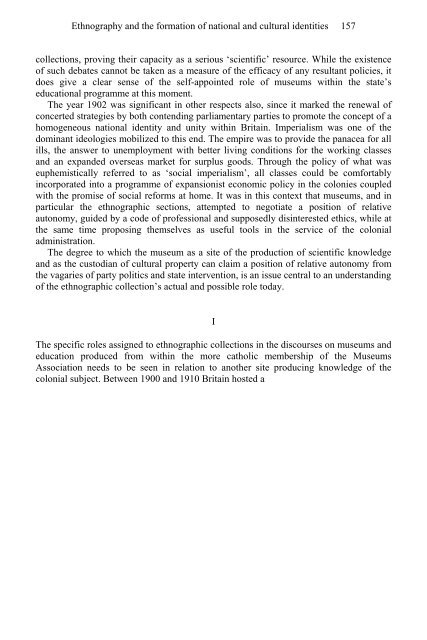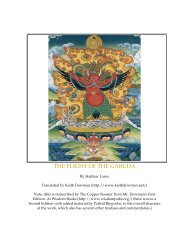Hiller - The Myth of Primitivism. Perspectives on Art - Esoteric Online
Hiller - The Myth of Primitivism. Perspectives on Art - Esoteric Online
Hiller - The Myth of Primitivism. Perspectives on Art - Esoteric Online
You also want an ePaper? Increase the reach of your titles
YUMPU automatically turns print PDFs into web optimized ePapers that Google loves.
Ethnography and the formati<strong>on</strong> <str<strong>on</strong>g>of</str<strong>on</strong>g> nati<strong>on</strong>al and cultural identities 157<br />
collecti<strong>on</strong>s, proving their capacity as a serious ‘scientific’ resource. While the existence<br />
<str<strong>on</strong>g>of</str<strong>on</strong>g> such debates cannot be taken as a measure <str<strong>on</strong>g>of</str<strong>on</strong>g> the efficacy <str<strong>on</strong>g>of</str<strong>on</strong>g> any resultant policies, it<br />
does give a clear sense <str<strong>on</strong>g>of</str<strong>on</strong>g> the self-appointed role <str<strong>on</strong>g>of</str<strong>on</strong>g> museums within the state’s<br />
educati<strong>on</strong>al programme at this moment.<br />
<str<strong>on</strong>g>The</str<strong>on</strong>g> year 1902 was significant in other respects also, since it marked the renewal <str<strong>on</strong>g>of</str<strong>on</strong>g><br />
c<strong>on</strong>certed strategies by both c<strong>on</strong>tending parliamentary parties to promote the c<strong>on</strong>cept <str<strong>on</strong>g>of</str<strong>on</strong>g> a<br />
homogeneous nati<strong>on</strong>al identity and unity within Britain. Imperialism was <strong>on</strong>e <str<strong>on</strong>g>of</str<strong>on</strong>g> the<br />
dominant ideologies mobilized to this end. <str<strong>on</strong>g>The</str<strong>on</strong>g> empire was to provide the panacea for all<br />
ills, the answer to unemployment with better living c<strong>on</strong>diti<strong>on</strong>s for the working classes<br />
and an expanded overseas market for surplus goods. Through the policy <str<strong>on</strong>g>of</str<strong>on</strong>g> what was<br />
euphemistically referred to as ‘social imperialism’, all classes could be comfortably<br />
incorporated into a programme <str<strong>on</strong>g>of</str<strong>on</strong>g> expansi<strong>on</strong>ist ec<strong>on</strong>omic policy in the col<strong>on</strong>ies coupled<br />
with the promise <str<strong>on</strong>g>of</str<strong>on</strong>g> social reforms at home. It was in this c<strong>on</strong>text that museums, and in<br />
particular the ethnographic secti<strong>on</strong>s, attempted to negotiate a positi<strong>on</strong> <str<strong>on</strong>g>of</str<strong>on</strong>g> relative<br />
aut<strong>on</strong>omy, guided by a code <str<strong>on</strong>g>of</str<strong>on</strong>g> pr<str<strong>on</strong>g>of</str<strong>on</strong>g>essi<strong>on</strong>al and supposedly disinterested ethics, while at<br />
the same time proposing themselves as useful tools in the service <str<strong>on</strong>g>of</str<strong>on</strong>g> the col<strong>on</strong>ial<br />
administrati<strong>on</strong>.<br />
<str<strong>on</strong>g>The</str<strong>on</strong>g> degree to which the museum as a site <str<strong>on</strong>g>of</str<strong>on</strong>g> the producti<strong>on</strong> <str<strong>on</strong>g>of</str<strong>on</strong>g> scientific knowledge<br />
and as the custodian <str<strong>on</strong>g>of</str<strong>on</strong>g> cultural property can claim a positi<strong>on</strong> <str<strong>on</strong>g>of</str<strong>on</strong>g> relative aut<strong>on</strong>omy from<br />
the vagaries <str<strong>on</strong>g>of</str<strong>on</strong>g> party politics and state interventi<strong>on</strong>, is an issue central to an understanding<br />
<str<strong>on</strong>g>of</str<strong>on</strong>g> the ethnographic collecti<strong>on</strong>’s actual and possible role today.<br />
I<br />
<str<strong>on</strong>g>The</str<strong>on</strong>g> specific roles assigned to ethnographic collecti<strong>on</strong>s in the discourses <strong>on</strong> museums and<br />
educati<strong>on</strong> produced from within the more catholic membership <str<strong>on</strong>g>of</str<strong>on</strong>g> the Museums<br />
Associati<strong>on</strong> needs to be seen in relati<strong>on</strong> to another site producing knowledge <str<strong>on</strong>g>of</str<strong>on</strong>g> the<br />
col<strong>on</strong>ial subject. Between 1900 and 1910 Britain hosted a




